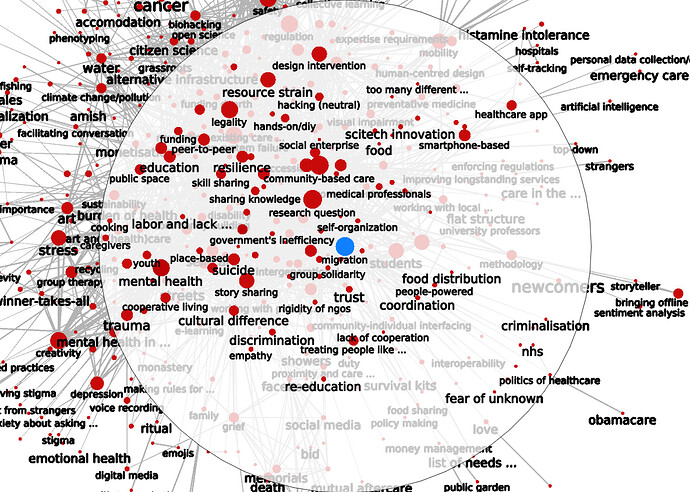Hi all, entering the collaborative ecosystem of edgeryders to explore how interests in anticipation / foresighting and collective intelligence design research might come together. Very early stage of an effort we have called anticipate - a collective Intelligence design research network, so right now mainly here to listen and learn. And, of course, share if we find something I could share. Hope that’s ok for a start ![]()
Hello @soenke, of course it’s OK. We are on an open platform exactly to enable that kind of thing to happen.
From your website,
if we want to rely on autonomous systems that can learn, we need to know much more about how to build institutions and organizations that learn.
otherwise, machine intelligence will not fully benefit human intelligence in key areas of life and labor.
Most of us here would agree. It seems to me that maybe you could be most interested in the Internet of Humans project (Internet of Humans). Maybe start there and see if it looks interesting. Do reach out if you need more directions, always happy to help.
Where are you based? If you are in Brussels or Stockholm, consider coming to share a coffee. ![]()
Thx much. Based in Saarbruecken, Germany, but will be in Brussels Jun 25-27 for the EU AI Alliance Assembly, not sure what to make of that dynamic (around the draft ethics-for-ai guidelines the EU has just published) yet but we will see…
@soenke thank you very much for joining us and quickly introducing yourself. We would be very interested in any of your insights. Also, if you need any specific help to reach out to collaborators or such please tell us so and we can see what we can do together.
Und falls du lieber auf Deutsch schreiben möchtest geht das auch 
Looks like you have come to the right place. Welcome.
Hallo Maria, vielen Dank. Wir sitzen gerade mit vielen Koop-Enthusiasten zusammen und schauen uns Experimente an wie Euer faszinierendes Open Care-Projekt; die DFKI-Kolleg*innen sind bei CrowdHealth dabei, hier vor Ort planen wir gerade einen Workshop zum Thema “Daten-Kooperativen” u.a. mit Salus Coop und einer Kollegin (Larisa Blazic) aus dem Libre Graphics Meeting - Netzwerk, das wir gerade in Saarbrücken zu Gast hatten, die sich derzeit mit dem Thema Data Union im Decode-Netzwerk auseinandersetzt. Ziel ist es, diese kooperativen Ansätze in einem grösseren Forschungsprojekt zu verankern, mal schauen, wie offen die Kolleg/innen sind. Alles sehr spannend, aber auch unübersichtlich, daher wollte ich mir bei Euch anschauen, wie das geht, vor allem, wie sich solche eher lokalen Dynamiken skalieren lassen. Darüber hinaus bauen wir einen Open Data Node auf, ggf als Teil des ODI-Netzwerks, mal sehen. Auf jeden Fall haben wir hier vor Ort eine Reihe von Mikro-Dynamiken rund um diese Themen und sind gerade dabei, nach sinnvollen Möglichkeiten der Bündelung zu suchen…
Hi John, thx much. I went to college in L.A. (one of the few people roaming the maze of city streets on a bicycle, I got lucky) at a time when labor unions were embracing social movement unionism, and some of my teachers were adamant about the role of community organizing in building better worlds, I never forget that. It is weird how quickly collective agency is attributed to tech these days, one way of obscuring such street/door-to-door-driven dynamics. Trying to figure out how to engage with tech without losing sight of these efforts is part of my interest in collective intelligence design, a very zeitgeisty term, I know, but it captures the need to reclaim the idea that all tech is at least in principle subject to collaborative (re)design.
I think the problem of how to engage with tech without losing sight of these efforts (street level organizing) is a problem more people have identified and at least wish there was a way to effectively deal with it. As Roger McNamee writes in “Zucked” (a book about Facebook that everyone should read), “the platforms are led by really smart, well-intentioned people, but their success took them to places where their skills no longer fit the job. They have created problems they cannot solve.”
We could quibble with how well-intentioned some of them really are, but the point is that tech can create situations that tech cannot fix.
As for biking in LA, in 2004 I lived in Santa Monica and got around on a bicycle. it was a breeze there, but a couple of times I had to venture out into LA itself and immediately the traffic got faster, the bike lanes went away and there was far more scrap and rubble in the areas close to the sidewalks. So I applaud you for surviving it.
Hallo @soenke,
Edgeryders Ethnographic Social Semantic Analysis tools könnten in dem fall interessant für euch sein.
wir können Diskussionen auf der Platform für Verbindungen und Intensität analysieren und mit verschiedenen Schwerpunkten visualisieren.
Hier ein Video: https://www.youtube.com/watch?v=G_DoEa3lcBE&feature=youtu.be
Du und deine Koop-Enthusiasten könntet die Platform für eure Diskussionen nutzen und in anderen partizipieren und wir könnten die Verknüpfungen die wir finden aufzeigen. Wäre das interessant?
@soenke Hier ist der link zu dem aktuellsten paper: Overleaf, Online LaTeX Editor falls du Probleme hast es aufzurufen sag bescheid und ich schick dir die PDF.
Klappt nicht, gern als PDF schicken, danke !!! Lg
Send via message 
